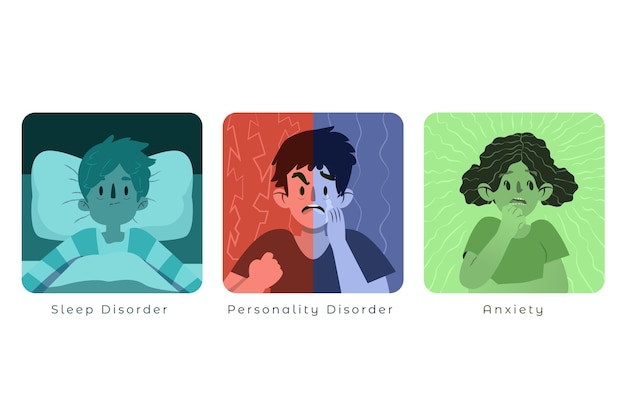
As we move towards the year 2025, the importance of establishing essential mental health goals cannot be overstated.
In today’s society, where mental health problems are becoming increasingly prevalent and affecting individuals from all walks of life, the necessity for a strategic and comprehensive approach to achieving better mental health outcomes is more critical than ever.
The challenges posed by stress, anxiety, depression, and other mental health issues require a concerted effort to not only address the symptoms but also to foster environments that promote well-being.
By setting clear, attainable mental health goals, we can create pathways to healing, support, and resilience, ensuring that individuals are equipped to navigate the complexities of modern life.
As we look ahead, it is imperative that we prioritize mental health initiatives and integrate them into our broader health and societal frameworks to make a lasting impact.
This blog explores the specific mental health goals we should aim for by 2025, the strategies to achieve them, and how they relate to our physical health and overall well-being.
Understanding Mental Health Challenges

Mental health challenges are diverse and can encompass a wide range of experiences, from common stress and anxiety to more severe mental disorders such as depression and schizophrenia.
Each individual’s journey to achieving a better mental health condition is unique and influenced by a multitude of factors that include genetics, lifestyle choices, and environmental conditions.
Understanding that mental health is not a one-size-fits-all issue is paramount. It requires a nuanced approach that recognizes the various dimensions of mental health challenges and the different ways they manifest in people’s lives.
As we move towards the year 2025, acknowledging the complexity of mental health conditions becomes increasingly crucial. The landscape of mental health is evolving, and with it, our understanding of the issues that individuals face.
Many people may experience a combination of stressors that exacerbate their mental health challenges. This can include workplace pressures, relationship difficulties, and societal expectations.
By recognizing these diverse factors, we can begin to cultivate a more comprehensive understanding of mental health that considers not only the individual but also the broader context in which they live.

Moreover, it’s essential to shift our focus from merely treating symptoms to understanding and addressing the root causes that affect mental health. This paradigm shift involves looking beyond traditional therapies and considering holistic approaches that encompass physical, emotional, and social well-being.
Treatment plans should be tailored to the individual, taking into account their unique experiences and challenges. This approach encourages a more proactive stance on mental health, where prevention and early intervention become integral components of care.
Education and awareness are vital in this journey toward better mental health for all. By fostering an environment where mental health is openly discussed, we can help to reduce the stigma often associated with mental disorders.
Community support and resources can play a significant role in empowering individuals to seek help and share their experiences. As society evolves, it is imperative that we create spaces where conversations around mental health are normalized, allowing individuals to feel safe and supported in their struggles.
The Mental Health Crisis

The world is currently grappling with a significant mental health crisis, with millions of individuals experiencing poor mental health.
This crisis is exacerbated by a lack of resources, social stigma, and inadequate mental health services. Addressing this crisis requires a multifaceted approach that includes education, policy change, and community support.
One of the primary goals for 2025 is to improve access to mental health services. By increasing availability and affordability, we can ensure that more individuals receive the support they need.
This involves not only expanding existing services but also integrating mental health care into primary healthcare settings.
Achieving these goals will require a concerted effort from various stakeholders, including governments, healthcare providers, and community organizations.
Setting Specific Mental Health Goals for 2025
To combat mental health challenges effectively, we must establish specific mental health goals that address the diverse needs of individuals facing various mental health conditions.
These goals should be both realistic and ambitious, aiming to create lasting change in society’s approach to mental well-being. Here are some essential goals to consider:
Increase Awareness and Education
By 2025, mental health education should be a fundamental part of school curricula. By educating young people about mental health conditions and their impacts, we can foster a deeper understanding of these issues.
This knowledge not only encourages empathy but also leads to early identification and intervention, which can significantly improve outcomes for those affected.
Reduce Stigma
Stigma remains one of the most significant barriers to seeking help for mental health conditions. Our goal should be to create a society where discussing mental health is as commonplace and accepted as discussing physical health.
This involves not only public awareness campaigns but also initiatives that promote openness and understanding in various communities.
Enhance Support Systems
Strengthening community support systems is vital for individuals dealing with mental health conditions. This includes training mental health first responders and creating comprehensive resources for peer support groups.
By ensuring that these support systems are robust and accessible, we can provide essential assistance to those in need.
Integrate Technology
Leveraging technology to provide mental health improvement tools, such as apps and online counseling services, can make support more accessible for everyone, especially those who may face barriers in traditional settings.
By 2025, we should aim for a seamless integration of technology in mental health care, ensuring that individuals have various options to seek help for their mental health conditions.
Promote Workplace Mental Health
Establishing mental health-friendly workplace policies is crucial in helping employees manage stress and improve overall job satisfaction.
By fostering an environment that prioritizes mental health conditions, organizations can enhance productivity and employee well-being, creating supportive workplaces for everyone.
Strategies for Achieving Mental Well-Being

Achieving mental well-being involves a holistic approach that considers both mental and physical health. Here are some strategies to promote lasting well-being:
Mindfulness and Meditation
Practicing mindfulness and meditation can significantly improve mental health by reducing stress and promoting relaxation. Encouraging these practices in schools and workplaces can lead to widespread mental health improvement.
Physical Health and Mental Health Connection
The connection between physical health and mental health is undeniable. Regular exercise, a balanced diet, and adequate sleep can positively affect mental health. By 2025, promoting these healthy habits should be a priority in both public health campaigns and personal health plans.
Community Involvement
Engaging with the community can foster a sense of belonging and support. Volunteering, participating in community events, and joining local support groups can enhance mental well-being and reduce feelings of isolation.
Access to Mental Health Services
Ensuring access to comprehensive mental health services is essential for addressing mental health needs. This includes expanding insurance coverage for mental health conditions and increasing the availability of mental health professionals.
Policy Advocacy
Advocating for policies that prioritize mental health is crucial. This includes pushing for legislation that supports mental health research, funding for mental health programs, and protective laws for individuals with mental health conditions.
Overcoming Mental Health Challenges
Overcoming mental health challenges requires resilience and support. It is important to recognize that the mental health journey is ongoing and that setbacks are a natural part of the process. By setting realistic goals and celebrating small victories, individuals can build resilience and continue moving forward.
Encouraging open conversations about mental health can also help normalize the experience of facing mental health challenges. By sharing stories and experiences, we can create a supportive environment that fosters understanding and empathy.
The Role of Technology in Mental Health
Technology offers innovative solutions for mental health improvement. From teletherapy to mental health apps, technology can provide accessible and convenient options for individuals seeking support.
Mental Health Apps
Mental health apps offer a range of services, from mood tracking and meditation guides to cognitive behavioral therapy exercises. These apps can be a valuable tool for individuals managing mental health conditions.
Teletherapy
Teletherapy has become an essential component of mental health services, especially in remote or underserved areas. By 2025, teletherapy should be an integral part of mental health care, providing individuals with the flexibility to receive therapy from the comfort of their homes.
Emphasizing Prevention and Early Intervention
Prevention and early intervention are key to reducing the prevalence of mental disorders. By identifying and addressing mental health issues early, we can prevent them from escalating into more severe conditions.
School-Based Programs
Implementing school-based mental health programs can help identify at-risk students and provide early support. These programs can include screenings, counseling services, and mental health education.
Workplace Wellness Programs
Workplace wellness programs can significantly reduce the risk of mental health problems. By offering resources such as stress management workshops and employee assistance programs, employers can support their employees’ mental health needs.
Building a Supportive Future for Mental Health by 2025

As we look towards 2025, establishing essential mental health goals is imperative for creating a society that values and supports mental well-being. By increasing awareness, reducing stigma, and improving access to services, we can address the mental health crisis and promote better mental health for all.
Achieving these goals requires a collective effort from individuals, communities, and policymakers.
By joining forces, we can build a future where mental health takes precedence, ensuring that everyone has the chance to flourish.

Celebrate Life’s Milestones in Camella!
House and Lot & Condominium for Sale in the Philippines


